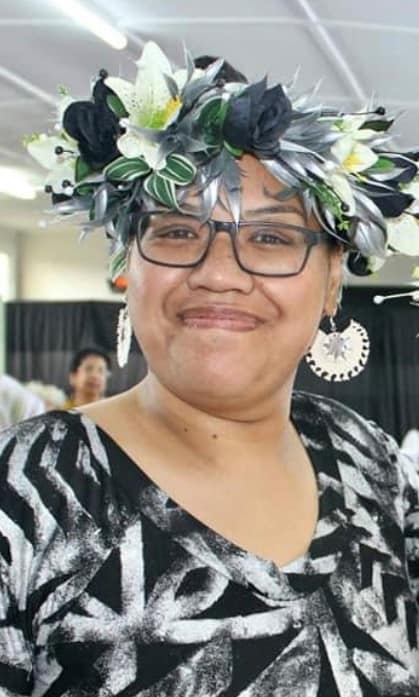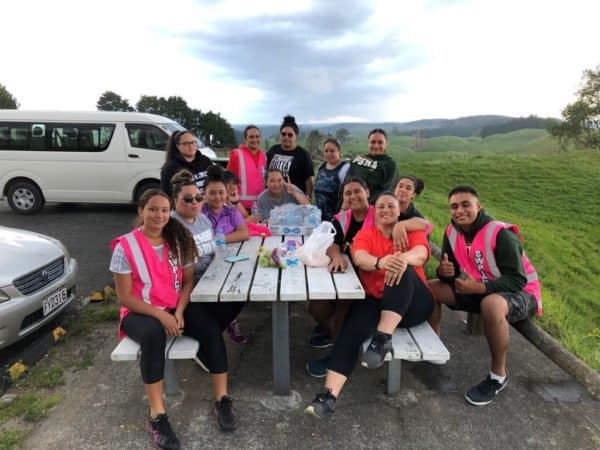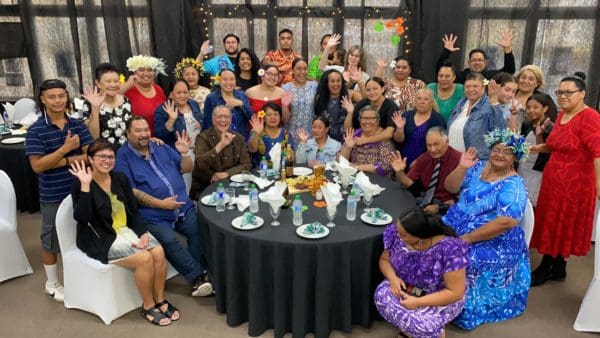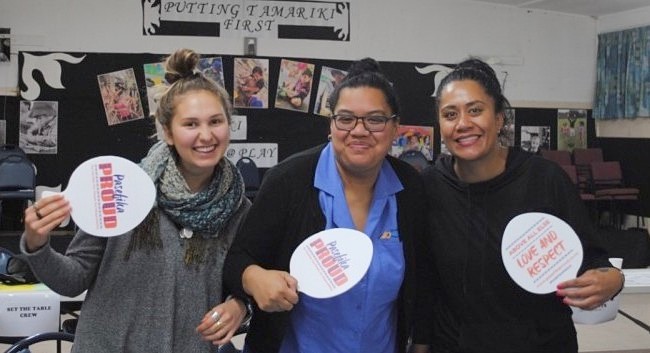Research voices: Elizabeth Okiakama
20 January 2022
Kia orana!
Elizabeth Okiakama is a community-based researcher who worked on the Pasifika Prediabetes Youth Empowerment Programme study (PPYEP)*. This study developed a collaborative partnership between university and community-based researchers, and two Pasifika communities in Auckland and Tokoroa, to empower youth to co-design, deliver and evaluate a community health intervention to prevent prediabetes.
Elizabeth (pictured above with fellow researchers Dani Prapavessis and Jen Filikitonga) works for South Waikato Pacific Islands Community Services (SWPICS) in Tokoroa, which supports the Pacific Islands community living in this town, many of whom are of Cook Islands decent. SWPICS was one of two community partners in the PPYEP project, led by Dr Riz Firestone at Massey University and facilitated by PhD student Dani Prapavessis.
A community need

When Elizabeth was first asked to work on PPYEP, her only prior connection to prediabetes was that her Dad had diabetes.
“It was a learning curve for me. However, I jumped on board with Dr Riz and Dani and they guided me through this programme. I had to find our participants, and explain to them that this is a youth programme, and that the outcome for us is to co-design an intervention and to raise awareness around prediabetes in our community”.
The key elements of PPYEP were an important drawcard for Elizabeth:
“We know that prediabetes is very high in our Pacific community and we have a large population of Pacific people in Tokoroa. I just wanted to encourage and support and raise awareness around how deadly this disease is. If we can prevent diabetes from being in our community and we can help that one extra person, we have made a difference”.
Community-centred
Elizabeth has some special qualities that made her the ideal person for co-ordinating the youth in this project:
“I have three teenagers so I get the gist of how teenagers feel these days. When it was time to recruit, I went straight to the local high schools. I recruited one teenager and then said to them ‘Ooh, do you think this person is suitable, yes of course! Do you think this person is suitable’…and the next minute I ended up with twenty young people doing the programme every Monday night.”
She was inspired by the youth recruited for the study.
“Having that consistent commitment from our young people – it encouraged me to keep going. They were looking forward to it, talking about it at school and always messaging me. I am like an Aunty and they would say ‘Aunty can you pick us up, or can you drop us off?’ I would always go that little bit extra so they had the support to come here, have a healthy meal, and then we could roll straight into our programme.”
Tangible outcomes

Being involved in PPYEP also revealed more about life in Elizabeth’s community:
“The struggle is definitely real in regards to prediabetes. And not just the disease, but everything that is around the disease, like the cost of food, the access to medication, doctors or medical care – it makes me want to support more, so these things can be readily available to our community.”
Even though the PPYEP intervention only ran for a short time, it has had some lasting change. Elizabeth shared one such example:
“For our PPYEP intervention, our young people co-designed an eight-week walking challenge. One participant continued the walking and now she looks amazing! She is still continuing that today because she was on that line of being prediabetic – she didn’t want to go there!”
“People who saw the change in her, like her sister, said ‘this programme has changed my sister’s future’. The eight-week challenge that this group of young people created has made an actual lifetime change for someone. That’s an awesome outcome for us.”
Sharing research findings

At the conclusion of the study the PPYEP research team went back to Tokoroa to share the findings of the research with the community. Elizabeth commented on how important it is to do this.
“It is good that our research is being noted and out there. But sometimes when research comes to us and goes, it doesn’t come back. We don’t have an outcome or we don’t know the findings…it needs to not stop halfway. We want to hear the feedback, whether it is good or bad. We want to hear the findings.”
“When we had the PPYEP celebration, these young people’s parents came along because they just thought ‘what have they been up to every Monday?!’ Riz and the team came along and we did a big presentation: this is what they were up to every Monday afternoon!”
On-going development
As well as helping to create a lasting change for members of her community, Elizabeth developed her own skills, especially in public speaking. She is now facilitating a follow-on research initiative in her community, funded by Healthier Lives.
“We have just started a new programme working with families instead of youth. I was very nervous going into this one as I am facilitating with adults, peers of my own age.”
Elizabeth is still in contact with the youth involved in the PPYEP study and happily talked about the various students and what are studying or where they are working. The strong connections made during the study endure:
“They are still actively involved. If we have an event, they are willing to come along and volunteer, just to give back.”
“Knowing that our young people in PPYEP made a change in another person’s life… that just fills my heart”.
Pasifika Prediabetes Youth Empowerment Programme (PPYEP) research page
*PPYEP was funded by the New Zealand Ministry of Health, the Health Research Council of New Zealand, and the Healthier Lives – He Oranga Hauora National Science Challenge, as part of a three-way partnership established in 2016 to invest in research aimed at improving long-term health conditions.
Other articles in this series:


